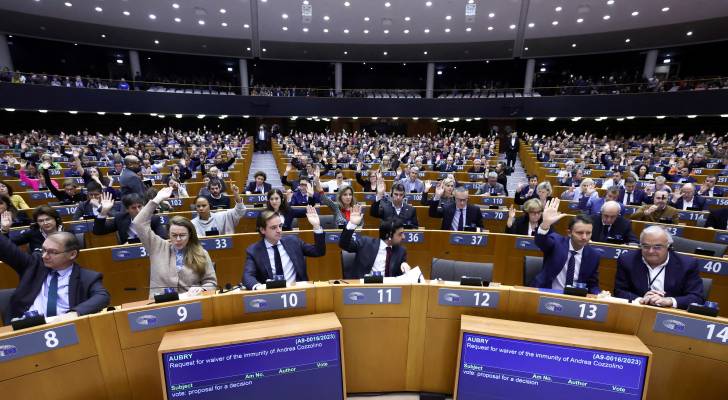European Parliament members call for ‘Israel’ Eurovision ban
More than fifty Members of the European Parliament (MEPs) have sent a formal letter to the European Broadcasting Union (EBU), demanding that ‘Israel’ be excluded from the Eurovision Song Contest 2026.
The MEPs' letter is a response to the EBU’s decision to allow ‘Israel’ to continue participating in the contest despite its ongoing aggression on Gaza, which some MEPs have described as a "genocide" and "war crimes".
Read more: Germany slams Eurovision boycott threats over ‘Israel’ participation
The signatories, who are predominantly from left-leaning political groups such as the Socialists and Democrats, the Greens, and The Left, argue that the EBU has applied a "double standard" by excluding Russia from the contest in 2022 following war with Ukraine, while allowing ‘Israel’ to remain a participant.
"Allowing a state under investigation for possible crimes of genocide to use Eurovision as a platform for whitewashing and cultural normalization goes against the spirit of this event," wrote Spanish MEPs Estrella Galán, Jaume Asens, and Vicent Marzà in the letter to the EBU.
Credibility Crisis for the EBU
The pressure from the European Parliament adds to a credibility crisis for the EBU. The organization’s long-standing position is that the contest is a "non-political" event.
In its official response to previous calls for exclusion, the EBU has defended its decision by stating that Eurovision is a competition between public broadcasters, not governments, and argued that ‘Israel's’ public broadcaster, KAN, is independent of its government.
However, the MEPs’ letter also raises more specific concerns about "possible voting manipulation" and the alleged use of "state-run promotional infrastructure" in support of ‘Israel’s’ entry.
The letter says this state-sponsored campaign was uncovered by the EBU’s own fact-checking service, undermining the EBU’s claim of KAN’s independence and making the contest a "tool of state propaganda".
The EBU has a history of inconsistent rulings. While it initially resisted calls to ban Russia in 2022, it reversed its decision and excluded the country after widespread pressure and boycott threats from member broadcasters.
Similarly, in 2021, the EBU disqualified two Belarusian entries for having an "obvious political subtext" before suspending and later expelling the country's broadcaster.
Threat of Boycott Looms
Spain, the Netherlands, Ireland, Slovenia, and Iceland have all indicated they will withdraw from the 2026 contest if ‘Israel’ participates.
The decision by Spain's public broadcaster, RTVE, is particularly significant as it is the first of the "Big Five" countries, which provide the largest financial contributions to the event, to threaten a boycott.
José Pablo López, the president of RTVE, stated that the "genocide currently taking place" in Gaza makes it "impossible for us to look the other way".
Similarly, Ireland’s RTÉ stated that participation would be "unconscionable given the ongoing and appalling loss of lives in Gaza," while the Dutch broadcaster Avrotros cited concerns over the "erosion of press freedom" and casualties among journalists.
Read more: Poland’s Culture Minister calls for Eurovision boycott if ‘Israel’ competes
For its part, ‘Israel’s’ public broadcaster, KAN, has confirmed its intention to participate in the contest, stating that there is "no reason why Israel should not continue to be a significant part of this cultural event, which cannot become political".
The EBU has opened a consultation process with its members to address the situation. Member broadcasters have until mid-December to confirm their participation for the 2026 contest, with a vote on ‘Israel's’ status scheduled for the EBU General Assembly on December 4-5 in Geneva.
A spokesperson for the EBU stated that it is "up to each Member to decide if they want to take part".




